welcome | bio | books | poems | news & events | multimedia | contact
Poems
Peacocks on the Streets | Immersion | Conversations During Sleep | The Keeper of LightPoems from Peacocks on the Streets
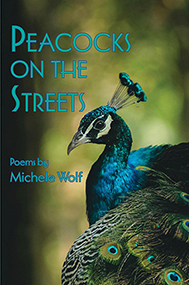
Poems from Peacocks on the Streets by Michele Wolf. Reprinted by permission of Broadstone Books. Copyright © 2025 by Michele Wolf.
Sky Lake Redux
Locked in the hothouse — my steamy, salt-air
Neighborhood crayoned with hibiscus, each blossom’s
Red stalk aiming its pollen-beaded headdress
Toward the sun — all of us knew which of our fellow
Alpha classmates had become pregnant, though no
Impromptu blooms would blaze to meet the light.
On my last Miami visit, my childhood
House was lost in a tangle of tropical greenery.
Stepping out of his pickup, the owner, whose
Fix-flip M.O. had not worked, admitted foreclosure.
Later, on Zillow, I wandered the shell of my vacant
House — the kitchen sleek with its brushed-steel fridge
And black-flecked granite, the pool pale sky blue,
The patio stone recast a ruddy sunburn pink.
Photo of my youth: on fire from napalm, a naked
Vietnamese girl sprinting, shrieking, as she fled
Her countrymen’s blast. At home, two-inch palmetto bugs
Ate crayons stashed in a shoe box bumping colored paper
And pencils in a closet, burst into a psychedelic mess
Whenever I thwacked one with a shoe. One time a friend
Barreled out of her house in only a T-shirt. Bad mescaline.
For the girls in my circle, earning A after A was a given,
Our engines vrooming even in the hours allotted
To lazing at Haulover Beach, a half dozen concert venues,
Discount Records, Greynolds Park. We had to get out.
One girl, ahead of us, Marxist romantic, alighted in
Berkeley, tutored prisoners with her boyfriend, founding
Soldier with the Symbionese Liberation Army. Sign-off
On its missives: “Death to the fascist insect that preys
Upon the life of the people.” She escaped, fading
Into the rain in England, soon after the first murder —
Oakland school superintendent — but before bank heists
And that machine-gun, stuff-into-the-trunk abduction
Of blindfolded heiress Patty Hearst, nineteen. Behind us,
Another girl, only three during the year of the napalm
Girl and whose yard slid down to the glossy lake,
Rose to the top of a corporation, asks parents to praise
Daughters for leadership skills, urges women to gather
In circles, build themselves a bigger box — lean in.
As kids — propped up on our elbows beside the murky
Edge of the lake, with our toes combing the chopped
Grass and the humidity pressed against us — we thought
We could pilot our afternoons as if they were float toys.
Steeped in the greenness, oversoaked by the gleamy
Heat of the sun, we monitored limb buds erupting
On tadpoles, clouds of them wriggling among the weeds.
Originally published in The Southern Review
The steel capsule, ridged and riveted — an oversize
Can — rests suspended at street level, docked
Inside the Air and Space Museum’s entrance.
A bounty of white lilies mingled with spider mums,
Placed yesterday, honors the trail of pilot John Glenn,
Dead at ninety-five. In ’62, even a second grader,
Gripped by the grainy blastoff in black and white,
Knew that the compact can was a bleak conveyance,
That that helmeted dad, a human Superman laced up
In a silver suit, could at any moment be lost in flames.
And yet we launch from terra firma, compelled to behold
The blue orb — its panorama of oceans as they curve
From continent to continent. It knocks you down,
This vision, your ache to enfold the globe in your arms.
It is that child who slips into the darkness, sounding
A cry you cannot ease, although you circle round and round.
Originally published in Painted Bride Quarterly
Listen to a critique of “To Orbit the Earth” and two other Peacocks poems on the Painted Bride Quarterly Slush Pile podcast “Episode 48: Paper Cranes & Zebras” »here.
My Elvis
Show me the ripened bride who is sure.
The night preceding our wedding, I couldn’t sleep.
I waited awake through the dawn that followed.
A decade later, our daughter plunks me into a chair,
Sends fireworks crackling through my nerves
By clicking on the wedding video. I’m fine as I witness
The ceremony, watching the cake-topper twosome,
Our glowing younger selves — you so princely
In your tux, your sun-on-the-sea green eyes
Fixed upon me. I’m fine until at the reception,
After our first dance, when you take my hand
And, on bended knee, backed up by the band
And the blaze of light radiating from one hundred
Guests, you croon — your voice holding open
The gate at the portal to our tomorrow —
That you can’t help falling in love with me.
Originally published in PoetsArtists
Peacocks on the Streets
It faces me down — so still, a fire of amber eyes
And mangy fur. One month into quarantine,
A lone coyote, gifted with the hush of empty
Streets, is visiting town, the block with the movie
Theater, commandeering the corner outside my door.
In Mumbai, honking peacocks strut their inky
Iridescence, flaunt their luxe medallioned
Capes, as they parade along the residential streets.
Mountain goats in coastal Wales laze on top
Of cars or window-browse at closed cafés and shops.
Maybe this will last a month, we imagined, maybe
Six weeks, as we loaded our cart with disinfectant,
A rotisserie chicken, toilet paper. The evening was
Warm, so we lit a barbecue out back, before the slew
Of animal sightings. Addled with virus news, we
Neglected to lock up. The next day, we discovered
That a thief had crept inside while we were dreaming,
Disappeared with our home safe — a trove of watches,
Diamonds, pearls. Not the items a person requires to
Confront the dying. Soon, the first of our circle would die.
Our daughter, age sixteen, cries daily, overwhelmed
By the “new normal.” Today my feed directs me
To James Taylor, old now, as I have become. He has
Been talking about depression, about, as a teen, living
For nine months in a psychiatric hospital, about addiction
And how lucky he feels that he’s survived. In a new video,
He sings, while sheltering in place, a song from an album
I played over and over, a balm to obliterate sorrow,
When I was sixteen — a song I hadn’t thought about
Or heard in some fifty years. It makes me sixteen again,
To hear that voice, so sincere, even after a thousand
Renditions, assuring me that I can close my eyes,
It’s all right. And, in a heap, I just break down.
At a pawnshop an hour away, our detective has found
My grandmother’s gold and diamond watch. He has
Nailed a suspect. Fin whales have launched a splashy
Playground at the port of Marseille. Our daughter,
I repeat to myself, is going to be all right. A coyote faces
Me on my corner. Living with wildlife is a part of life —
What we fear, what we prize. Wild loss is what we have.
Originally published in The Hudson Review
Place of Great Bones
'Sconset, Nantucket
It is the edge of the beginning, the sun-spattered sweep
Of the Atlantic, its salt breath levitating you each
Time you pause at a vantage point on the bluff.
The village cottages, boxed in cedar-shingle fringes
Buffed to gray, are centuries old. All have names —
Auld Lang Syne, House of Lords — and sprout hedges
Of hydrangeas, masses of blue globes, perky petaled breasts
Aloof to their allure. At sunrise, seals arc like tubby
Dolphins, nuzzle heads together, flippers slapping high-fives
Close to shore. The ocean enfolds you, ever breathing
In your ear. And who is to say you cannot own
This place, that it cannot own you? The houses sit
So near their neighbors. Sound carries — a baby’s shout,
A bicycle crunching against the crushed shells of the lane —
But never drowns out the churn of the surf, the wind as
It sifts through spiky beach grass and Rosa rugosa. Pink
Button roses, they stand watch at their shrubby command,
Fencing the beach from the road. Shrug off, if you wish,
The men dressed up to dine in brick-colored pants. Claim
The bluff, the cottages lost in time, this “Place of Great Bones,”
Siasconset. Claim the cracked whale fin bone, a stone
Too heavy to lift, on the ramshackle porch of the former
Fisherman’s shack you lease, its rickety windows encasing
The ocean in every room, the vast beach vacant
At the height of the season. Claim your heartbeat, your
Mind, which boots up, on cue, its slideshow of watery
Vistas. Your feet scuff the ground or hover above it.
Claim eighty-some years if you’re lucky, dusted with sand.
Originally published in The Hudson Review
Read other poems from Peacocks on the Streets »here and »here and »here.
Poems from Immersion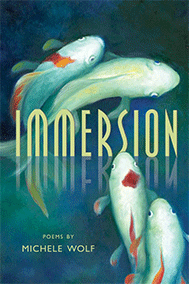
The Great Tsunami
She recognizes its crest in the way he looks at her.
The wave is as vast as the roiling mass in the Japanese
Print they had paused in front of at the museum,
Capped with ringlets of foam, all surging sinew.
That little village along the shore would be
Totally lost. There is no escaping this.
The wave is flooding his heart,
And he is sending the flood
Her way. It rushes
Over her.
Can you look at one face
For the whole of a life?
Does the moon peer down
At the tides and hunger for home?
Originally published in Poetry
Michele reads “The Great Tsunami” at an AWP D.C. off-site event, February 4, 2011 »here.
Immersion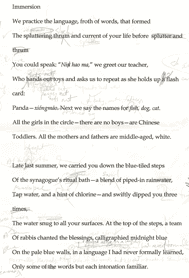
We practice the language, froth of words, that formed
The slosh and current of your life before
You could speak:“Ni hao ma?" we greet our teacher,
Who passes out toys and asks us to repeat as she holds up flash
cards:
“Panda” — xiongmao — followed by “baby,” “mother,” “father,” “dog,”
“Cat.” All of the girls in the circle, and the sole boy, are Chinese
Toddlers. Most of the mothers and fathers are middle-aged, white.
At summer’s close, we carried you down the blue-tiled steps
Of the synagogue’s bath — a swirl of piped-in rainwater,
Municipal water, and a bit of chlorine — and swiftly dipped you
Three times, the water snug to all your surfaces. At the top of the steps
A trio of rabbis chanted the blessings, calligraphied midnight
Blue on the pale blue walls. I recited along in a language I had never
Formally learned, some of the words and all the intonations familiar.
Little flame, you will be the birthright of who you are,
Independent of water or vocabulary.
We work on the words. That’s why in the post office, just a few weeks
After we had brought you home, when the Asian American clerk,
In her sixties, spotted you soaking up your new world
From your stroller, puckered up her face, then gazed again at me
And, with accented English, clenching my heart in her hands,
Inquired, “She’s yours?” I managed to answer, “Yes. And I’m hers.”
Why couldn’t she see I had become Chinese?
Originally published in Crab Orchard Review
Late Bloomer
It flares up at sunrise, a blush in a bramble
Tumbling out of its bed by the city pavement — a single
Rose, coral heat, at the end of the season.
And you are drawn to it, to its scent, its silky
Layers, to its core. It gathers you into its
Body until you lose your balance, all you can see
Is a petaled grid, an endless repetition
Of roses. You sink, swirling, into the rose,
Deep into the rose, into the rose.
I hold you to me. Love, I am forty-four,
And you, love, you, my love,
You have planted me.
Originally published in Poetry East
Pocono Lakeside
As I was guided by the director through the thick space
Of these rooms, worn sparrow brown, and strode
With the August sun on my shoulders across this particular
Acre of grass, nobody had told me this was the place
Where you had summered as a boy. I have weathered
My fourth decade, older now than you were
When you died. I can barely remember you, yet I can see
You not as my father but as my son. You are age nine.
The downpour divides into two massive stage curtains
Parting. You bolt from the bunk, loudly racing
With your chums down the slippery hill to the dock,
Your cape of a towel flapping as if ready to lift you airborne.
You are the smallest. Still, you always run in the front.
You do not know how beautiful you are, of course, squinting
Against the sun, the flame that escapes behind the gray
Vapor for hours, sometimes for days. You cannot see
That from the beginning it has been eyeing you from afar,
That it has focused its golden spotlight just for you.
Originally published in Poetry
Attempting to Fly
This was your home. This was the section of town
Where you worked. These were your streets,
Every neglected rut and pothole. These were your
Buildings, damn it, your ATM, your drugstore, deli,
Shoe-repair shop, your Borders Books & Music.
This was your subway station, brace of cars
Screeching along the tracks. These were your neighbors.
You wake up at night, unable to breathe.
These were your neighbors. So when you return
To what was your home, needing to see
Whatever you can see, to walk
The streets, to breathe the air, to breathe
Your neighbors, you expect to find what?
A knuckle hidden under a park bench? A shoelace
Covered with dust? You need to see, and the sign
In front of you, for the workers, reads
“WASH MASK. WASH BOOTS. EAT.”
A flatbed truck creeps out to the street with a steel
Girder. The site is concealed from view. You hear
The nonstop pounding and whir of excavation.
A crane pivots. In every direction, abandoned
Buildings are boarded and buttressed. You see
The brightest sky looming, the tallest void.
You see what you saw, as it happened, on TV,
From where you had moved at the end of August,
Two hundred miles from this shrill noise
And absence. You see what you did not see,
What a friend had confirmed from the heights
Of Water Street that morning, what he had witnessed
Again and again, projectile bodies and body parts
Catapulting en masse from the two towers, and those
Still alive, who had elected to leap, who had
Fled being melted down like candle wax,
Flapping their meager wings,
Attempting to fly.
Originally published in Potomac Review
Read Michele’s poem “Archaeology” on Verse Daily »here.
Read other poems from Immersion »here and »here and »here.
Poems from Conversations During Sleep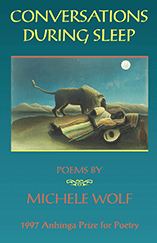
The Sleeping Gypsy
Henri Rousseau, 1897
In the heat of her dream, she hears
The iron kettle boiling, its scuttle and hum
As hurried as hoofbeats across a plain.
She drops in two guinea hens. Dancing
In a ring round her skirts, the children
Cheer, “Auntie, the English song!” Lifting
Her lute, she sings of the cat and the fiddle,
The cow jumping over the moon. How the little
Ones hoot when the dish runs away
With the spoon. Ah, spoon — an uncloaked
Lute, it waits to be strummed. The temptation
Of spoon. The temptation of London, of Paris,
Of bumping along in the carriage with M. Philippe
In his top hat and greatcoat to visit
The peacocks, turquoise and gold and green, each
Roaming the Bois de Boulogne with one hundred eyes.
She sleeps in the desert, under a smiling full moon
That shines in the teal night. Quiet behind her,
A lion stands, tail erect, having sniffed
At her onyx flesh, at the ribbony stripes
His color blindness darkens on her muslin dress,
All rainbow hues. She is lost in a dream,
Always happiest out of doors, without shoes.
Originally published in Poetry
Keep Going
I was led to the trees, as if someone with muscle
In her walk had pushed me. Heading
To the leaves — regal, molten with their final
Chance to breathe, Indian summer — I stopped
By the crowd shouting at the blue police barricade,
Mile 25. This was the moment, one of 26,000
Runners, you presented yourself, dazed and red-faced,
Soldiering on. Although I was too astonished
To speak, your name issued from me, the same way
A cut bleeds, the eyes allow us to see.
“Keep going!” I shouted, again without forethought.
Slowly, your mouth fashioned my name, then
You continued, working to control your body,
Pushing on through a life out of control.
“I can’t sit still,” were your words, so urgent,
Serving as much as a plea and apology as a goodbye.
Yet it is the way we would sit together
For which I remember you. We would talk only briefly
Or not talk, leaning against each other while the light
Turned to darkness over the Hudson, until we were sitting
In darkness, and one of us, without any active thought,
Might quietly speak, or rise to turn on a light,
Or move closer to the other, as if the darkness
Itself had spoken and thought were held away
Like an outsider, standing outside a barrier,
And we were not going anywhere. We were inside.
Originally published in The Hudson Review
For My Mother
I sharpen more and more to your
Likeness every year, your mirror
In height, autonomous
Flying cloud of hair,
In torso, curve of the leg,
In high-arched, prim, meticulous
Feet. I watch my aging face,
In a speeding time lapse,
Become yours. Notice the eyes,
Their heavy inherited sadness,
The inertia that sags the cheeks,
The sense of limits that sets
The grooves along the mouth.
Grip my hand.
Let me show you the way
To revolt against what
We are born to,
To bash through the walls,
To burn a warning torch
In the darkness,
To leave home.
Originally published in When I Am an Old Woman I Shall Wear Purple
Toilette
She lifts the white, lace nightgown
Over her head, waits for hot
Water to flow into the basin.
The billowing curtain sheer, tulip appliquéd,
Rises with the breeze, revealing
The dogwood’s veil of ivory blossoms,
Each with its nubby green core,
Soft-claw edges dipped in mauve.
She washes her face, slides
The washcloth along her armpits,
Between her legs, rinses.
A rush-hour traffic report —
Stalled tractor trailer, half-mile backup —
Radios faintly from the bedroom
Across the yard. She brushes her teeth,
Inserts a contact lens, blinks,
Readies the next one, when an arm
Encircles her waist, a scratchy
Face rests in the curve
At the base of her neck.
Cut off by the mirror, her index
Finger holds out the clear,
Waiting lens to the light
Like a sacrifice. A tiny, malleable cup,
It adheres, balances, preens.
It knows it’s been cleansed,
That after its nightly soak — eight
Free-floating hours lazing in saline,
On wave after wave of dreams —
It offers, with transparent
Pleasure, the power to see.
Originally published in The Hudson Review
Veterans Memorial
It shone in the photos, a granite wingspread,
A chevroned, dark, shimmering bird
As seen from the sky. But now on the ground,
Months after his own great flight,
It is only a steady climb.
He shadows the black wall, the earth
A trajectory rising to mirror his launch
Through time. Midway, hand in his jacket
Pocket, holding the frayed white paper
With the name and date, its crosshatched
Creases as sheer as the folds
Of an overused map, he begins racing.
Stopping short downslope, he locates
The panel, a line listing ’71s, a cluster of Ps,
Fingers dancing on the stone until the fire
Of particular letters carved lurches
Him backward: Errol Perkins Jr.
“Bui!” he shouts — “Dust!” — swiftly
Pounding the wall with his fist.
“Go back to your country,” his people
Had taunted him. American. “Bui doi” —
Dust of life. Monster. Ugly. Child of dust.
Striking his father’s name, he finds
Himself pummeling his own reflection
On the glassy surface, his wet-streaked
Face, his big-eyed, dark, American face.
58,000 dead. An army forgotten: 25,000 born.
He imagines this father, nineteen, in crisp
Khakis and oversize dusty boots,
Carefully carrying three pink, magenta-spotted
Orchids — fragile, alert, on tall stems,
Strutting up his mother’s litter-strewn,
Bustling, unpaved street right before
A storm, wind whipping the palm fronds.
His fluttery mother, performing both roles
In a play she had reenacted countless
Times, portrayed each detail
About the orchids, his father’s
Drum-in-the-throat laugh.
She had selected him for his laugh.
Six weeks later, stepping through swamp
Grass, one of those heavy, snug-laced
Boots touched off a land mine,
Lifting him fifteen feet in the air
With the ease of a bird’s leap, the way
A gust sweeps up a scrap of paper,
Tossing him skyward to be lost
In a spray of blood, the blast
Scattering random pieces of flesh.
Originally published in the Journal of Progressive Human Services
Read more poems from Conversations During Sleep »here.
Poems from The Keeper of Light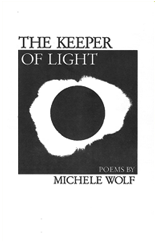
The Keeper of Light
The little one listens but never reveals
What she knows. By day she controls the light
That filters across the roofs, through
Trees, on furrows of plaintive faces.
She wakes up alone and unlocks
Cabinets of light, allots the portions
Strictly, patiently hears requests
For additional rays. What a job.
She has to be careful. Not long ago,
In a moment of passion, she almost
Gave away the whole reserve. Phones
Incessantly ring. Amazing, someone
Thanks her for light. She has to hang up.
Her cheeks are ballooning, deflating,
As if she were some nervous fish.
She scoots in the broom closet, fits
On the funnel. Her face is beaming.
She targets the freshly erupting supply
Into a spare metal cashbox, hides it
Under newspapers in her desk.
No one has noticed. Flushed,
She sorts through the mail,
Coos a wilted sigh. So many tasks,
Yet the barest assistance.
When she leaves, later, again,
She will dot the night, star by star.
Originally published in Boulevard
Man with Picture Frame
90th and Third, NYC
We almost missed him, although his face,
As blunt as a busy Picasso, all shifting
Planes, was wedged in a picture frame.
We almost missed him, the way one can stop
Seeing hunched-over bodies along the street
Or a favorite picture above the sofa
In the living room, so familiar it seems
Invisible, until it has drifted askew
Or been removed. “If only he had something
More contemporary,” my companion offered.
The man in the frame extended his crushed
Paper coffee cup, fingers hugging its Greek
Pillars and statues, white and blue.
“Spare any change?” he asked. I brought
Forth a quarter. His eyes, brilliant, said
I am a masterpiece. This is where I live.
Originally published in Poetry
Astigmatism
When I held smooth the satin to zip
Up your wedding dress, frosted with flounces
And pearl-beaded filigree, a rococo
Confection more sugary than the cake,
And watched as you swiveled slowly to face
Me — all floaty notes, pure flute — so still
As I situated the baby’s breath and the veil,
How could I have told you, knowing
You’d learn it soon enough, my perfect doll,
How fuzzy the world is, how the clearest
Picture, frill-tipped gladioli in primary
Colors, can dissolve into darkness, how
The eye can fool you, presenting a straight
Or diagonal path when the earth is curved.
“It can be corrected,” I tell you, a half-truth,
When you call me to say you can no longer
Focus, nothing is sharp. And I can hear
How the light is bent in your voice, the shadows
Behind what you say, while in my mind’s
Eye you stare at me, blinking, a week old,
The day you were placed in my arms,
Able to distinguish little but two black
Moons, my eyes dancing in the fog.
That this was the most exquisite
Instance of my childhood never changes.
Nor does the decade between us
Or the way you looked up at my face
After racing out the front door
To greet me eight years later, almost
Toppling me over, ringing my waist.
Two sisters, so nearsighted
That upon my return to you, before
I resumed my groping tromp
Through the world, you held me like a reference
Point, a place you will always find,
The sheen of your eyes announcing
My bearings as much as your clear
Shout of my name, as your words: “You’re here.”
Originally published in Southern Poetry Review
All poems Copyright © 2025 Michele Wolf
